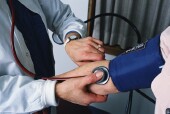
MONDAY, July 18 (HealthDay News) — Supplements of milk and soy protein lowered blood pressure modestly among hypertensive patients, a small, new study found.
The researchers suggest that replacing some refined carbohydrates — such as white bread and white rice — in your diet with soy or milk protein “might be an important component of nutrition intervention strategies for the prevention and treatment of hypertension.”
While the reduction in blood pressure was small, study leader Dr. Jiang He, chairman of epidemiology at the Tulane University School of Public Health and Tropical Medicine in New Orleans, said the benefits could translate to reduced numbers of strokes and other cardiovascular problems in the population as a whole.
“The reduction is not large in an individual, but significant at the population level,” he said.
But several heart experts cited a number of limitations with the research, including the short duration of the trial.
The study, published online July 18 in the journal Circulation, was funded by the U.S. National Heart, Lung, and Blood Institute.
Nearly 75 million Americans have high blood pressure, which increases the risk of heart attack, stroke, heart failure and kidney damage.
He and his colleagues evaluated the effects of milk and soy protein supplements and a carbohydrate supplement among 352 adults who either had pre-hypertension or stage 1 hypertension — that is, systolic readings (the top number) ranging from 120 to 159 mmHg and diastolic blood pressure readings (the bottom number) from 80 to 95 mmHg. Ideally, pressures should be below 120 over 80.
Each person took 40 grams of a supplement daily for eight-week periods. He and his team evaluated the participants’ blood pressure at the start and end of each phase.
The carbohydrate supplement served as a comparison.
“Our study found that over an eight-week intervention, soy protein was associated with a 2 mm reduction in systolic blood pressure,” He said. “Milk protein supplement was associated with a 2.3 mm reduction in blood pressure readings.”
While the reduction wasn’t large, He estimates it could lead to 6 percent fewer strokes, for instance, in the general population.
He believes the study is the first of its kind to find a benefit from milk and soy protein in blood pressure reduction.
Dr. Thomas Giles, president of the American Society of Hypertension Specialist Program and a past president of the organization, called the study results underwhelming.
“You couldn’t possibly make any dietary changes based on this study,” said Giles, who is also a professor of medicine at Tulane University School of Medicine.
Among the study’s flaws, he said, was that the researchers did not measure blood pressure for 24 hours, using an ambulatory monitor.
Dr. Suzanne Steinbaum, a preventive cardiologist at Lenox Hill Hospital in New York City, said, “I think future studies need to be done,” since the new study was fairly small and did not cover a long period of time. Still, she added, “It shows us the importance of diet and modifying risk factors.”
Small changes could make a difference, Steinbaum said. She suggests replacing animal fat with soy protein — such as substituting a veggie burger with soy protein for a hamburger with animal protein, at least occasionally.
He offers many suggestions for those who want to maintain a healthy blood pressure. “Control your weight,” he said. “Don’t smoke.”
The DASH diet (Dietary Approaches to Stop Hypertension) is a reasonable eating plan, he said. He also advises monitoring pressure regularly.
He reports consulting for Novartis and Forest Laboratories, which make blood pressure-lowering medicines.
More information
To learn more about blood pressure control, visit the U.S. National Heart, Lung, and Blood Institute.

